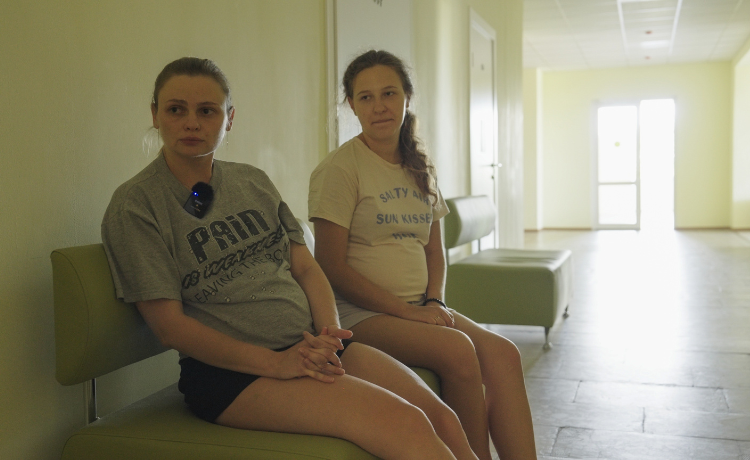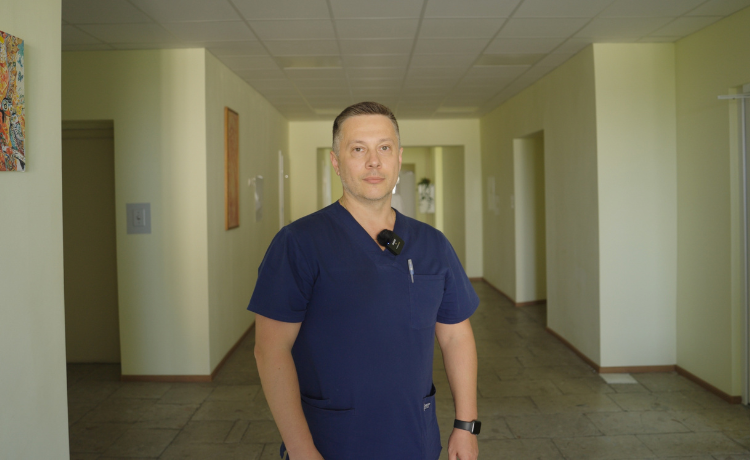News
As Russian air strikes escalate against Ukraine, a hospital in Kyiv struggles to care for pregnant women and newborns
- 27 August 2024
News
KYIV, Ukraine — “When the alarm went off, we were all rushed into the shelter,” said Oksana, who is 26 weeks pregnant. “Even the tiniest babies from the neonatal intensive care unit were brought down by nurses and aides, who carried them gently because they are too fragile for the mothers to move them on their own.
“It’s nerve-racking to see, especially at night when everyone is already on edge.”
A massive wave of Russian air strikes have hit Ukraine, targeting critical civilian infrastructure and causing widespread damage and casualties. With barely any access to electricity, health workers at the Kyiv Regional Perinatal Centre struggled to care for pregnant women, new mothers and newborn babies.
“It’s incredibly hard,” Oksana told UNFPA, the United Nations sexual and reproductive health agency, which is supporting the hospital. “My family and my husband's family are in Sumy [in northeastern Ukraine], where explosions are a daily occurrence. I’m constantly worrying about them, and it definitely affects my health and well-being.”
For Yuliya, another expectant mother from Irpin, in the Kyiv region, the violence has become almost routine. “I was brought here because of complications, which were exacerbated by the constant stress and anxiety,” she explained.

“The ongoing attacks, the alarms – they have a profound impact on both the baby and the mother. It’s not just about me; it's about my unborn child. The anxiety from knowing an attack could happen at any moment is indescribable.”
Describing her family as “pillars”, she added, “We try to hold onto hope, but it’s hard not to think about what kind of future awaits our children.”
Adapting to instability
As the strikes continue to devastate several areas of Ukraine – targeting not only cities but also the country’s energy infrastructure – hospital staff and patients face constant instability.
“Pregnant women are already in a delicate emotional state,” said Yuliya. “Being responsible not just for their own lives but for the lives of their unborn children, and then having to endure attacks and constant alarms – it’s unbearable. We even hear the explosions while we’re in the shelters."
The hospital is crucial for many expecting women and newborns in the region. But early on the morning of Monday 26 August, a sudden power outage caused a total blackout.
“The explosions were close, and we lost power across the entire hospital,” Ogorodnyk Artem Oleksandrovych, head of obstetrics at the hospital, told UNFPA.
“We were operating on generators, but that means certain facilities, like elevators, are out of service. We prioritized powering critical areas like the neonatal intensive care unit, operating rooms, and delivery suites.”

Gradually, the medical team has adapted to their new reality. “Over the past years of constant bombardment, we've had to become quite resourceful,” explained Dr. Oleksandrovych.
“We’ve had to perform emergency procedures in complete darkness, relying on flashlights from our phones until the generators kicked in. Those seconds feel like an eternity when you're in the middle of a critical operation.”
“Working in this environment is challenging, to say the least,” he continued. “But we never stopped working – childbirth doesn’t wait for safe conditions. We are here 24/7, every day of the year.”
So far this year, WHO has reported over 230 attacks on health-care facilities across Ukraine, putting the lives of millions at risk, particularly vulnerable pregnant women and newborns.
A dedication to delivering
Under these constant threats, the hospital has had to innovate. “We have a delivery room in the shelter now,” Dr. Ogorodnyk said. ‘If we can postpone certain procedures, we do. But when it’s about delivering babies or performing life-saving surgeries, we have the facilities to do it underground.”

Health workers in Ukraine are dedicated to providing care and support to those who need it most, even as their lives are put at risk. UNFPA supports a wide network of medical facilities and mobile health units across the country, ensuring the delivery of essential sexual and reproductive health supplies and pharmaceuticals, as well as dignity kits and gynaecological surgery rooms. This is all the more urgent in a context where, by 2023, nearly one quarter of maternal and neonatal facilities were unable to function.
UNFPA also provides static and mobile incubators, helping bridge the gaps in maternal and neonatal supplies and services as the national health system comes under continued attack, in defiance of international humanitarian law.
“The reality is harsh,” Dr. Oleksandrovych said. “But we have adapted. We have no choice but to keep going. The lives of our patients depend on it – and we will not fail them, no matter the circumstances.”